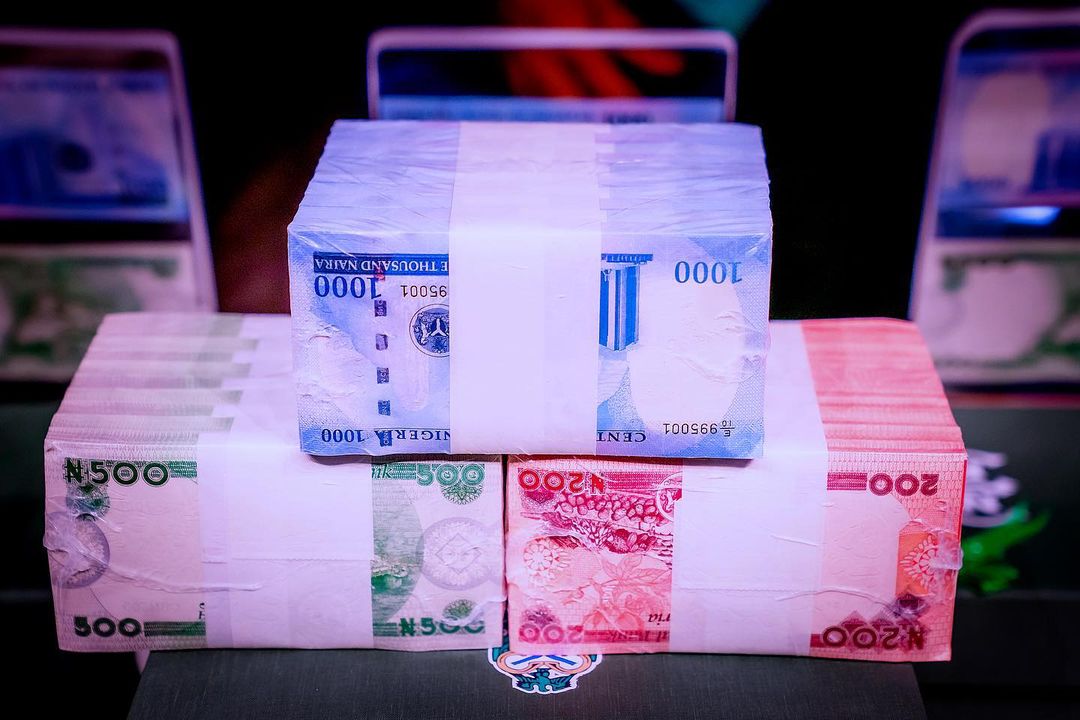
Naira swap: Protests trail Supreme Court order, FG seeks dismissal of ruling
Protesters yesterday besieged the headquarters of the Central Bank of Nigeria, CBN, and the office of the Attorney-General of the Federation, AGF, over the interim order of the Supreme Court halting the deadline for use of old naira notes.
A seven-member panel of the apex court, led by Justice John Okoro, had also yesterday, temporarily restrained the Federal Government from restricting the use of the old naira notes after February 10.
The ex-parte application was filed by the governors of Kaduna, Kogi, and Zamfara states.
Meanwhile, the Federal Government has asked the apex court to dismiss the suit for want of jurisdiction.
Speaking with reporters in Abuja, Obed Agu, one of the leaders of the protesters from Civil Society Organisations, CSOs, said President Muhammadu Buhari should issue an executive order, maintaining February 10 as the deadline for the use of old naira notes.
Contrary to the request of the protesters, governors, yesterday begged President Buhari to extend the deadline for the use of the old notes.
Similarly, the International Monetary Fund, IMF, also advised the CBN to extend the deadline because of the difficulties of obtaining the new N200, N500 and N1,000 notes.
This came as the All Progressives Congress, APC, presidential candidate, Asiwaju Bola Tinubu, hailed state governors for aligning with Nigerians over the new Naira and cashless policies and saving the country from anarchy.
But the Labour Party said it is not yet Uhuru for vote buyers, especially those celebrating the apex court interim order.
Speaking on behalf of the protesters, Agu said the apex court’s order was “not legal”, adding that with the injunction, the court will enable politicians to buy votes.
His words: “We call on President Buhari to issue an executive order for the February 10 deadline and prevent further extension. The Supreme Court wants to aid corrupt politicians to buy votes.
“The Supreme Court order on the ex parte application has no legal basis. We are rejecting it because it is a plot to open the bank vaults to enable vote buyers and holders of illicit wealth to have the cash to buy votes.
“We ask the CJN to hurriedly vacate the ex parte order in the overall interest of Nigeria’s election. We have suffered a lot at the hands of the Supreme Court in undermining any effort for a credible election. The Supreme Court voided the card reader which aided and increased official election result-rigging.”
Some of the placards had inscriptions such as ‘Justice Ariwoola, resist plot to use our Supreme Court to undermine democracy;” “Police, SSS don’t allow opponents of Naira redesign to burn banks and destroy public property;” “We stand with CBN;” “Old Notes: On February 10, 2023 deadline we stand.”
The demonstrators also passed votes of confidence on the CBN governor, Godwin Emefiele and the AGF, Abubakar Malami, for their handling of the recent naira redesign policy.
As a result of the protest, vehicles coming into the Central Business District in the nation’s capital, Abuja, through Tafawa Balewa Way, were forced to go through either Sani Abacha Way or Herbert Macauley Way for about half an hour.
The group urged Nigerians not to accept the old naira notes from February 10, in their own interests.
Vanguard gathered that hour after the Supreme Court order, the CBN governor met with President Muhammadu Buhari but details of what they discussed were not revealed to pressmen.
Why Supreme Court halted CBN’s Feb 10 deadline.
By a unanimous decision, a seven-member panel of Justices of the Supreme Court had earlier yesterday, restrained the Federal Government from enforcing the February 10 deadline for the use of N200, N500 and N1,000 old Naira notes pending determination of a suit that was filed by three northern states.
The states, Kaduna, Kogi and Zamfara, had through their Attorneys-General, invoked the original jurisdiction of the Supreme Court to intervene in the matter.
They told the court that residents in their respective states had suffered untold hardship, owing to scarcity of the redesigned naira notes.
According to the plaintiffs, unless the apex court intervenes, the situation can degenerate into chaos and anarchy.
They noted that the inadequacy of the new banknotes made it impossible for economic activities to thrive in their states.
Consequently, they begged the apex court to halt the full implementation of the monetary policy of the CBN regarding the deadline for use of the old Naira notes.
While granting the ex-parte application the states filed through their team of lawyers, led by Mr. AbdulHakeem Mustapha, SAN, the Supreme Court, headed by Justice Inyang Okoro, fixed February 15 to hear the substantive suit.
It ordered service of the relevant processes on the Attorney-General of the Federation and Minister of Justice, Mr. Abubakar Malami, SAN, who was cited as the sole Respondent in the case.
Specifically, the Supreme Court issued an order of interlocutory injunction, “restraining the Federal Government, either by itself or acting through the Central Bank of Nigeria and/or the commercial banks; its agents; agencies; corporations; ministries; parastatals; organizations or through any person or persons (natural and artificial) howsoever, from suspending or determining or ending on the 10th of February 2023, the time frame within which the now older versions of the 200, 500 and 1000 denominations of the Naira may no longer be legal tender pending the hearing and determination of the substantive suit.”
The plaintiffs, in the main suit, are among other things, seeking a declaration that the Demonetization Policy of the Federation being currently carried out by the CBN under the directive of the President of the Federal Republic of Nigeria, is not in compliance with the extant provisions of the Constitution of the Federal Republic of Nigeria 1999 (as amended), Central Bank of Nigeria Act, 2007 and actual laws on the subject.
They applied for, “A declaration that the three-month notice given by the Federal Government of Nigeria through the CBN under the directive of the President of the Federal Republic of Nigeria, the expiration of which will render the old banknotes inadmissible as legal tender, is in gross violation of the provisions of Section 20(3) of the Central Bank of Nigeria Act 2007 which specifies that Reasonable Notice must be given before such a policy.
Besides, the states urged the apex court to direct the immediate suspension of the demonetisation of the Federal Government of Nigeria through the CBN under the directive of the President of the Federal Republic of Nigeria until it complied with the relevant provisions of the law.
The plaintiffs told the apex court that since the CBN announced the new naira policy, there has been an acute shortage in the supply of the new naira notes in their respective states.
They lamented that residents in their states who complied with CBN’s directive and deposited their old naira notes have increasingly found it difficult to access new naira notes to conduct their daily businesses.
They maintained that the inadequacy of the new naira notes as well as the haphazard manner in the monetary policy was being implemented, has wrought serious hardship on residents in their states, stressing that the 10-day extension of the deadline would not be sufficient to address the challenges occasioned by the policy.
In an affidavit the plaintiffs filed in support of the suit, which was deposed to by the Attorney General and Commissioner for Justice of Kaduna State, Aisha Dikko, they told the apex court that although the naira redesign policy was introduced to encourage FG’s cashless policy, they noted that not all transactions could, however, be conveniently carried out through electronic means.
Dikko averred that several transactions still require cash in exchange for goods and services hence the need for the Federal Government to have sufficient money available in circulation for the smooth running of the economy.
“That the majority of the indigenes of the Plaintiffs’ states who reside in the rural areas have been unable to exchange or deposit their old naira notes as there are no banks in the rural areas where the majority of the population of the states reside. Most people in rural areas of the Plaintiffs’ states do not have bank accounts and have so far been unable to deposit their life savings which are still in old naira notes.
“There is restiveness among the people in the various states because of the hardship being suffered by the people, and the situation will sooner than later degenerate into the breakdown of law and order.
“I know that if the Federal Government of Nigeria had given sufficient and reasonable time for the naira redesign policy, all the current hardship and loss being experienced by the Plaintiffs’ State Governments as well as people in the various states would have been avoided.
“I know that the 10-day extension by the Federal Government is still insufficient to address the challenges bedevilling the policy. I also understand that the Federal Government cannot bar Nigerians from redeeming their old naira notes at any time, even though the senior notes are no longer legal tender.
FG asks S’Court to dismiss state govs’ suit
Meanwhile, the AGF, Malami, yesterday, asked the Supreme Court to dismiss a suit by three state governments challenging the





